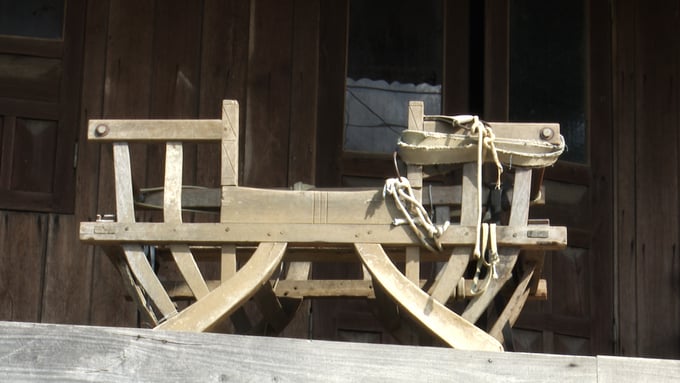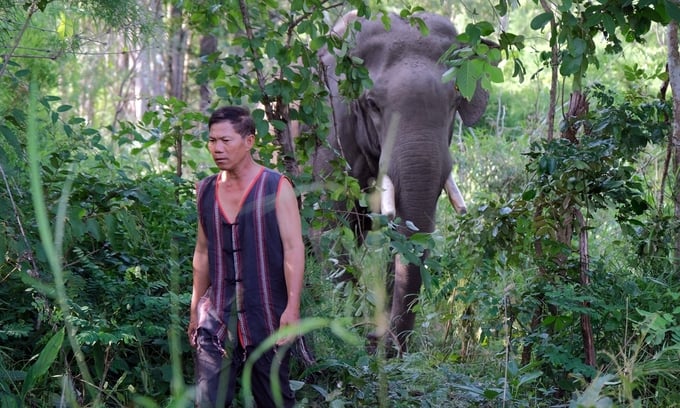May 29, 2025 | 02:04 GMT +7
May 29, 2025 | 02:04 GMT +7
Hotline: 0913.378.918
May 29, 2025 | 02:04 GMT +7
Hotline: 0913.378.918
Y Lit led us to the howdah, which was respectfully displayed in the home of a miniature museum in Krong Na commune, Buon Don (Dak Lak). This is the smallest capacity available for a single settee. Y Lit stated that he utilized this howdah to travel to the village. A second, larger vehicle with two to three seats for adults once served experience tourism.
Each has a distinct appearance but is now covered in a dense layer of grime. In February of this year, the Buon Don Hanging Bridge Tourist Center announced that the elephant transportation service would be discontinued. It is also the end for chairs that were once regarded as the pinnacle of respect.
Elephants were used to protect important sites, lead processions and festivals, and transport the monarch and mandarins during the Ngo, Dinh, and Le dynasties. Since then, not only elephants but also elephant armchairs are required to be solemnly and magnificently embellished. In paintings and photographs that have survived to the present day, the elephant armchair is as large as a single bed and is covered in variegated brocade and a canopy.
Ede and M'Nong people in the Central Highlands frequently construct howdah from timber frames and rattan strands. It is fastened to the elephant's back when transporting people, furnishings, or armchairs. People use a large rattan rope, which they wrap securely around the elephant's neck, tail, abdomen, and armpit in order to prevent the howdah from tilting when the elephant runs or traverses a slope.
Historically, the howdah was both a means of adorning elephants and a symbol of authority. According to Y Lit, who had unsuccessfully followed his father into the forest multiple times to pursue elephants, only "Gru" had the confidence to recline in this position.
Who exactly is Gru? There is no precise definition for this term, but in the community of elephant hunters, anyone who has hunted 15 or more elephants is granted this title. Gru is the chief hunter during the elephant hunt, leading and directing the complete company of hunters. They are attired in exquisite attire and seated atop the group's brightest and strongest elephant. The remainder are known as subordinates - Rmak.
Subordinates are also divided into numerous levels. If you have recently hunted or hunted under three animals, you must be naked, don a loincloth, rest on the side of an elephant's belly, and you may not consume white fish. These individuals must gather coals, prepare rice, and even remain awake at night to keep watch over the group. Passing this threshold allows the new hunter to don a tunic and consume white fish, but he is still Gru's assistant.
Before the day of elephant hunting, hunters were required to desist from many activities because elephant hunting was an extremely hazardous occupation. A squad of elephant hunters is divided into three sections. In turn, the groups will approach the foremost forest elephant, its mother, and its infant. The domestic elephants will attack after Gru sounds the horn and gives the signal. The hunting elephant will separate the baby elephant from its mother and wait for it to fail to catch up with the herd after the leader of the herd shows symptoms of losing the conflict by roaring and signaling the entire herd to flee. At that moment, Gru will hurl the rope, hooking the infant elephant's left hind limb. Rmak will descend and select a large tree to tie the cord around so that the young elephant can run a few more steps. The infant elephant circled the tree trunk as if it were tying itself in position.

The howdah represents Gru's authority, currently preserved by Y Lit as an heirloom. Photo: Quoc Nhat.
The procedure of taming a newborn elephant can take up to a year if the elephant is particularly stubborn. To be certain, Gru selects only 3- to 5-year-old elephant calves. Less frequently, elephant calves attach to their mothers, making it difficult for them to survive on their own after capture; despite their size, elephants have distinct personalities and are difficult to control.
Depending on the size of the forest elephant herd and Gru's experience, each hunting party may consist of up to ten to fifteen domestic elephants, or as few as three to five, depending on the number of individuals in the forest elephant herd. In the past, Ede and M'Nong believed that becoming Gru was a great distinction not only for the individual but also for the entire family, due to Gru's great responsibility.
According to legend, when Buon Don was founded, wild elephants would gather here to inflict havoc. Born in 1828 and passing away in 1938, Y Thu Knul sought to capture and tame untamed elephants. As the most renowned chieftain in the mountains and forests of the Central Highlands, he progressively discovered and founded villages, thereby assisting in the stabilization of people's lives. Specifically, he once captured a white elephant, a creature revered as sacrosanct by the Ede and M'Nong, and presented it to the monarch of Thailand. The Thai monarch, impressed by his skill, bestowed upon him the title Khun Ju Nop, which means "elephant hunting king."
Y Prong Eban, also known as Ama Kong, her grandson, continued in her footsteps by hunting elephants. President Ho Chi Minh once presented him with a certificate of commendation for his contributions of elephants to the resistance war. Ama Kong is also the last person to reside in Y Thu Knul's three-room home on stilts made of precious timber worth more than ten elephants at the time it was completed.
When there were many untamed elephants in the past, elephant hunting was relatively simple. On some excursions, Mr. Ama Kong captured as many as ten juvenile elephants. However, this number progressively decreases over time. Ama Kong herself observed the same thing. After completing his final hunting expedition around 1996, he "washed his hands and put away his sword" and became involved in the conservation and domestication of elephants in Yok Don National Park.

Mr. Y Lit, owner of Bac Plang elephant, who follows him in Yok Don forest. Photo: Ba Thang.
This decision by Ama Kong had a significant impact on the perceptions of succeeding generations. Y Mat, the proprietor of the Y Khun elephant who participated in the campaign to relocate elephants from the Tanh Linh forest, stated that he has worked as an assistant elephant hunter since he was 18 years old. However, both times he entered the forest, he was unsuccessful. After witnessing a herd of difficult-to-breed elephants, he renounced his ambition to become Gru.
Mr. Y Lit, proprietor of the Bac Plang elephant, stated that because domestic elephants are rarely released and are primarily tethered at home, they progressively lose their natural instincts. In addition, their front legs are frequently chained, making it difficult for male elephants to leap up to mate. Likewise, female elephants frequently become exhausted from incessant labor, so they do not want to mate with male elephants.
This is the polar opposite of elephants in the wild, which may travel scores of kilometers per day. Having a vast habitat helps forest elephants maintain reproductive health.
Recent plans for the eighth Buon Ma Thuot Coffee Festival, to be held in 2023, no longer include elephant parades in Dak Lak province for the first time. At the Buon Don Elephant Festival, the Organizing Committee did not organize elephant races, swimming elephants, or soccer elephants. Instead, they held elephant worship ceremonies, elephant makeup contests, elephant buffets, and elephant greeting contests for the audience, where they could take pictures with the elephants.
Thai Hong Ha, director of the Dak Lak Department of Culture, Sports, and Tourism, stated, "All levels and sectors of the province are working closely with Buon Don district to continue propagating and mobilizing elephant owners and construction enterprises to transition from an elephant-riding tourism model to an elephant-friendly tourism model, with the goal of ending elephant riding tourism and contributing to the conservation of domestic elephants in Dak Lak."
Translated by Linh Linh

(VAN) The mutual export of agrifood products between the European Union (EU) and the United Kingdom (UK) must occur again without certification, border controls or other red tape. This was agreed at the UK-EU summit.
/2025/05/22/5121-2-173645_677.jpg)
(VAN) NBSAP Tracker identifies strengths and areas for improvement in the National Biodiversity Strategy, based on each region’s priorities and capacities.

(VAN) The draft amendment to the Circular on rice export trading stipulates a periodic reporting regime for rice exporting enterprises.

(VAN) Dong Thap farmers attained an average profit margin of 64% during the summer-autumn 2024 crop (first season), while An Giang and Kien Giang farmers followed with 56% and 54%, respectively.

(VAN) As a doctoral student doing research on renewable energy and electrification at Harvard University, the author shares his musings on electricity, nature, and countryside memories.

(VAN) The decree on Extended Producer Responsibility (EPR) ensures transparent management and disbursement of support funds, avoiding the creation of a “give-and-take” mechanism.

(VAN) Hue City rigorously enforces regulations regarding marine fishing and resource exploitation, with a particular emphasis on the monitoring of fishing vessels to prevent illegal, unreported, and unregulated (IUU) fishing.